 Petzlover
Petzlover Carpatin is originated from Romania but Lucas Terrier is originated from United Kingdom. Carpatin may grow 43 cm / 17 inches higher than Lucas Terrier. Carpatin may weigh 71 kg / 157 pounds more than Lucas Terrier. Carpatin may live 3 years less than Lucas Terrier. Carpatin may have more litter size than Lucas Terrier. Carpatin requires Low Maintenance. But Lucas Terrier requires Moderate Maintenance
Carpatin is originated from Romania but Lucas Terrier is originated from United Kingdom. Carpatin may grow 43 cm / 17 inches higher than Lucas Terrier. Carpatin may weigh 71 kg / 157 pounds more than Lucas Terrier. Carpatin may live 3 years less than Lucas Terrier. Carpatin may have more litter size than Lucas Terrier. Carpatin requires Low Maintenance. But Lucas Terrier requires Moderate Maintenance
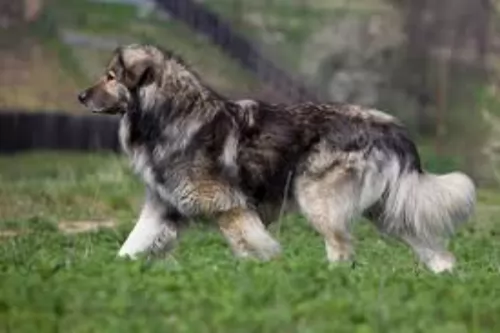 The Carpatin, known also as the Carpathian Shepherd Dog or Romanian Shepherd, is a large breed dog known for his guarding- and watch-dog abilities. Information about these dogs dates back to the 1800s, and much later, in March 1998, fans of the dog founded the Carpathian Shepherd Dogs Club.
The Carpatin, known also as the Carpathian Shepherd Dog or Romanian Shepherd, is a large breed dog known for his guarding- and watch-dog abilities. Information about these dogs dates back to the 1800s, and much later, in March 1998, fans of the dog founded the Carpathian Shepherd Dogs Club.
It is believed that the different Carpathian Shepherd Dog breeds are descendants from dogs that were developed thousands of years ago in Mesopotamia. Documentation of the origins of the dog are rare but it is thought that they are probable descendants of Lupomolossoids. However in 2005, it was finally recognized by the Federation Cynologique Internationale, and in 2006, it was recognized by the United Kennel Club. However, it is still a rare breed outside Romania.
 The Lucas Terrier is a rare breed which hails from England, originating there in the late 1940s. Today it is considered a purebred. It was originally a hybrid dog, bred by crossing a Norfolk Terrier with a Sealyham Terrier.
The Lucas Terrier is a rare breed which hails from England, originating there in the late 1940s. Today it is considered a purebred. It was originally a hybrid dog, bred by crossing a Norfolk Terrier with a Sealyham Terrier.
Sir Lucas felt that the Sealyham Terrier was a bit too big for his purpose so he crossed the Sealyham with Norfolk Terriers to bring about the Lucas Terrier. The Lucas Terrier is a dog which is essentially bred for temperament and companionship and is therefore not aggressive.
The Lucas Terrier has been in the United States of America since the late 1960s and is considered a rare breed.The Lucas Terrier Club is a private, informally run organisation developed to both preserve and promote this dog breed.
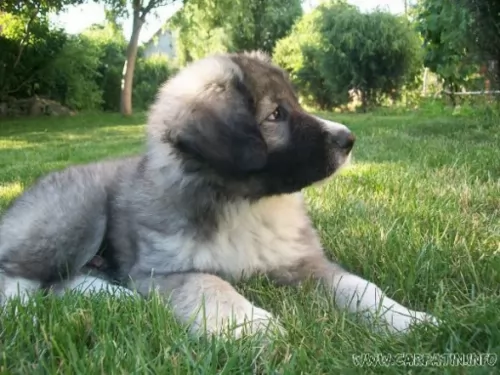 The Carpatin is a large breed dog, standing at 65 to 73cm in height and weighing between 32- and 80kg. The skull of the dog is wide and domed, the ears medium set and floppy. The neck is strong and muscled, the legs strong and straight, the chest deep.
The Carpatin is a large breed dog, standing at 65 to 73cm in height and weighing between 32- and 80kg. The skull of the dog is wide and domed, the ears medium set and floppy. The neck is strong and muscled, the legs strong and straight, the chest deep.
The tail of the Carpatin is long, bushy and high set and his coat is double layered, medium length and pale fawn in color with light grey to black shades being seen as well.
The Carpatin is patient, loving and protective. This is a strong-willed dog who is independent and fairly easy to train as he is intelligent.
It is a good idea to have him trained and socialized as this brings out the best in him. He is a patient and affectionate dog and he’ll get on well with children and tolerate other pets in the home.
They are wary of strangers and become vocal, barking and growling and taking their guard dog role seriously with strangers around.
 The sweet Lucas Terrier is a small dog breed that stands at between 25 – 30cm in height and weighs anything between 5 – 9 kg.
The sweet Lucas Terrier is a small dog breed that stands at between 25 – 30cm in height and weighs anything between 5 – 9 kg.
The chest of the dog is deep and low, the nose black, the eyes dark and almond shaped, the ears medium sized and floppy. The tail is traditionally docked, giving the dog an attractive, solid, compact look to it.
If you want your Lucas Terrier to become a parent, you can expect between 3 to 5 of the cutest little puppies. Spaying and neutering are an excellent idea health-wise if you don’t want your terrier dog to have puppies.
The weather-resistant coat of the Lucas Terrier is fairly harsh and is of medium length. While most Lucas Terriers are fawnish, cream, grey or black and tan, you also get a white one.
He does great with training and socialization and is an adaptable dog too, being happy to settle into life in the city or the countryside.
This is such a sweet, amicable, jaunty little dog, good with kids and always ready for a game. With socialization and training he is ready to get on well with everyone, as well as with other dogs in the house. It is no wonder that he is becoming so popular – he just gets on with everyone, and is eager to please.
The Lucas Terrier is generally well behaved as well and being quiet, gentle and calm indoors. Because he is a Terrier, he likes to bark quite a bit, but training and socialization can help with that. Training won’t be difficult as he is intelligent.
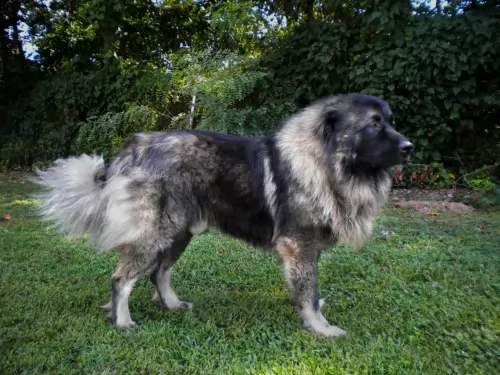 The Carpatin is a big, independent dog who loves his human family. He will guard them too and has all the intelligence and skills to be instinctively alert to danger. Territorial, he makes an excellent watchdog.
The Carpatin is a big, independent dog who loves his human family. He will guard them too and has all the intelligence and skills to be instinctively alert to danger. Territorial, he makes an excellent watchdog.
He isn’t too social around strangers, but with training and socialization he becomes more relaxed and amicable. He responds well to training, especially when he has a firm, strong handler and owner.
Used to being a herding- and working dog, he is happiest when kept busy and isn’t a dog to use essentially for guarding only as he can become aloof and aggressive. Treat him well and have him trained and socialized and you’ll have a wonderful guardian and companion.
 Lively, playful, social and animated – the Lucas Terrier is such a pleasure to have around and will bring joy into your home. He is full of enthusiasm and will always be ready for a game or for a walk.
Lively, playful, social and animated – the Lucas Terrier is such a pleasure to have around and will bring joy into your home. He is full of enthusiasm and will always be ready for a game or for a walk.
They are dogs who just love being around their human family, forming close bonds with them. They’re adaptable too and slot into different situations with ease.
Gentle, calm and obedient, once you let one of these sweet dogs into your home and heart, you’ll never want to be without such a loving friend again.
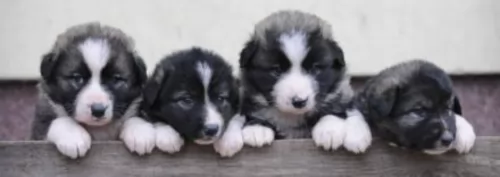 The beautiful Carpatin dog can live to be a healthy 12-14 years if you feed him nutritious foods, provide him with clean water every day, exercise him, give him a dry, warm bed and give him loads of love, attention and care.
The beautiful Carpatin dog can live to be a healthy 12-14 years if you feed him nutritious foods, provide him with clean water every day, exercise him, give him a dry, warm bed and give him loads of love, attention and care.
However every dog can become ill and with the Carpathian Shepherd Dog you certainly want to be aware of ear and eye infections, hip dysplasia and skin disorders.
 Your Lucas Terrier is such a robust, jaunty, feisty little dog and with excellent care from you he may be able to push two decades. With a healthy diet and exercise, you shouldn’t have to be at the vet often with this dog.
Your Lucas Terrier is such a robust, jaunty, feisty little dog and with excellent care from you he may be able to push two decades. With a healthy diet and exercise, you shouldn’t have to be at the vet often with this dog.
There are however, always common dog illnesses that even the most healthy dog can succumb to – ear infections, eye infections, bloat, cancer, hip dysplasia and others.
Skin problems may seem mild, but they can bring a whole lot of frustration and pain to your pet. You’ve got to be careful because sometimes skin problems may be indicative of other health issues. Probably the most common cause of skin problems in dogs are allergies from parasites like fleas.
Bacterial skin infections are caused when your pet is bitten by a flea for instance and then he scratches and licks, breaking the skin and bacteria gets in, infecting the wound.
Yeast infections for instance could be found in the ear canal and around the anus. Infections like this occur in damp areas and also when other conditions are right. Yeast infections cause itchy skin with hair loss.
Skin infections are not to be taken lightly. They can bring a whole lot of discomfort to your pet and you will most certainly need to get him to the vet.
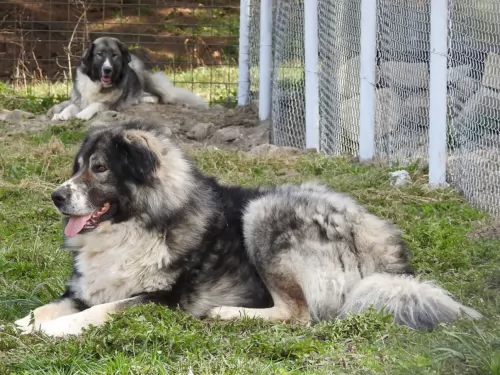 Despite his longish coat, the Carpatin is a low to moderate maintenance dog. To avoid tangles and matting, you’ll need to brush his hair at least twice a week. He won’t however require professional grooming.
Despite his longish coat, the Carpatin is a low to moderate maintenance dog. To avoid tangles and matting, you’ll need to brush his hair at least twice a week. He won’t however require professional grooming.
Dogs with floppy ears will need to have the ears checked to ensure they remain fee of moisture and wax buid-up. The ears can be easily infected when left uncleaned. The nails and teeth should also be checked. Canine toothpaste and brush can help to prevent plaque build-up which can cause gum disease and tooth decay. Not only that, dental disease can lead to other health issues in other parts of the body.
The Carpatin is a medium- to high energy level breed dog and he will therefore need a good amount of exercise to keep him healthy and content. Rope him in to your activities whether you go jogging or cycling. Put him on a leash and take him with – he’ll love it. Dogs who are allowed to be active and part of the family are simply better dogs.
Your Carpatin’s weight, age and activity levels will guide you as to what food is best for him. He needs nutritious food and if you’re unsure how to choose, your veterinarian can advise you on what to look for.
Apart from proteins, your dog needs fats, fiber, carbohydrates, minerals and vitamins. As your dog ages, he or she will go through different life stages, and you want to be sure of ensuring your dog is getting everything he needs to ward of disease and stay happy and healthy.
Make sure your 4-legged canine friend always has a bowl of fresh, cool water available to him.
 This little dog isn’t a high energy dog but he will need to have a daily walk over and above the games you provide him with. Giving him a walk will be stimulating for him too as it gives him the chance to see different things and sniff around a bit.
This little dog isn’t a high energy dog but he will need to have a daily walk over and above the games you provide him with. Giving him a walk will be stimulating for him too as it gives him the chance to see different things and sniff around a bit.
The Lucas Terrier is looked upon as a low maintenance breed and a low shedder. You will need to brush him twice a week to keep the coat lustrous and to remove loose hair. Hand stripping is a method used for grooming his double coat but some people prefer to have him professionally clipped.
Feeding a dog should be a simple affair. All dog breeds appreciate a simple but nutritious diet as this avoids digestive problems.
The Lucas Terrier relies on quality food full of vitamins and minerals to ensure his health and longevity. True, commercially manufactured foods aren’t a wonderful choice, but there are some good ones and they do offer a tremendous amount of convenience.
However, you don’t just want to put a bowl of dry kibble in front of your pet night after night, so to add some tasty variety, boil chicken and brown rice or pasta along with some cooked or raw vegetables and add this to his dry kibble from time to time. It makes like a delicious kind of stew to add to the dry kibble.
You’ll see, your Lucas Terrier will have bright eyes, a wet nose and a wagging tail. He’ll thank you for sticking to a simple style of feeding that doesn’t come with unpleasant surprises to upset his stomach. Make sure he always has a bowl of fresh cool water constantly available.